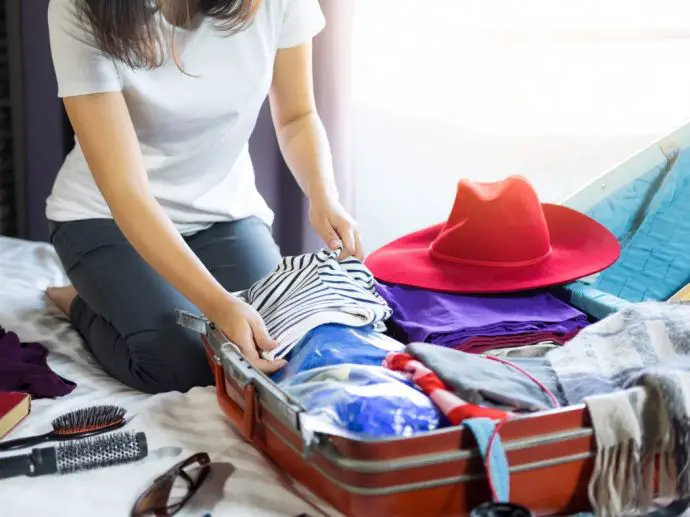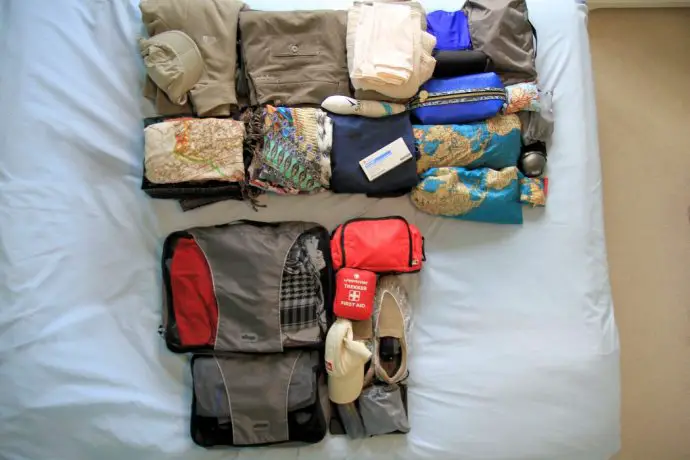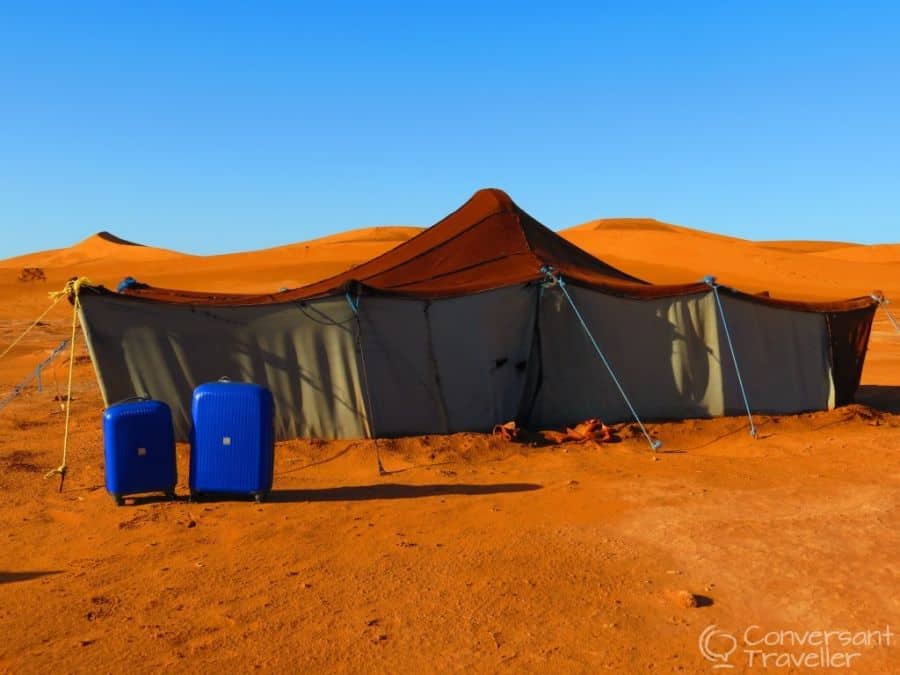Essentials of Luggage Packing
Packing smart can make your trip much easier. The right bag, a good list, and clever organizing will help you bring what you need without overpacking.
Choosing the Right Luggage
Choose a bag that suits the tip of trip you’re going on, and the length. For short trips, a carry-on suitcase or backpack works well. Longer trips may need a bigger suitcase. Hard-shell bags protect fragile items better, while soft bags can squish into tight spaces.
Look for bags with wheels to save your back. Multiple pockets help keep things tidy and a waterproof bag is great for rainy places or beach trips.
Think about where you’re going. A backpack is better for rough roads but a sleek suitcase fits in nicely for city travel.
Basic Packing List
Start by writing a packing list to help you keep track of the process. Begin with clothes and pack outfits you can mix and match. Bring layers for changing weather and don’t forget socks and underwear!
Next, add toiletries, remembering that travel-size bottles save space. Remember your medications. Don’t forget to pack chargers for your devices, including a portable battery which can be very useful whilst you’re away.
Bring important papers like your passport and tickets. Keep copies in a separate spot.
Some extras to consider:
- Snacks
- Water bottle
- Book or e-reader
- Travel pillow
- First-aid kit
Organising Your Items
Use packing cubes or Ziploc bags to group similar items, this makes finding things easier. Try to roll up items of clothing to save space and prevent too many wrinkles. Heavy things are best packed at the bottom of your bag.
Fill empty spaces with small items like socks. Use shoe bags to keep dirty soles away from clean clothes.
Keep important stuff in your carry-on. This includes valuables, medications, and a change of clothes. Make a list of what’s in each bag. This helps you keep track and repack easily.

Maximizing Space
Smart packing helps you fit more in your suitcase. These tips will show you how to use every inch of space wisely.
Folding vs. Rolling Clothes
Rolling clothes often saves more space than folding. Try rolling shirts, pants, and underwear tightly. This method also reduces wrinkles.
For bulky items like sweaters or jackets, folding may work better. Lay them flat at the bottom of your suitcase. Mix rolling and folding to find the best combo for your luggage. Experiment with different ways to see what fits best.
Layering Approach
Start with a layer of shoes at the bottom of your suitcase. Stuff socks and small items inside the shoes to use that space. Next, add a layer of rolled clothes then place folded items on top.
Fill gaps with small items like chargers or toiletries. This creates a tight, stable pack. Think of your suitcase like a puzzle – each piece should fit snugly with the others around it.
Using Packing Cubes
Packing cubes are great for organising your suitcase, and there are several different sizes you can buy. Use cubes to group similar items together, for example, put t shirts in one, dresses in another, and underwear in another. It makes finding things much easier.
Compression cubes squeeze air out, making clothes take up less space. Cubes also help you repack quickly if security needs to check your bag. Everything stays neatly sorted.

Outfit Combinations
Creating versatile outfit combinations is key to packing smart for any trip. You’ll maximize your wardrobe options while minimizing luggage space. Let’s look at some strategies for putting together stylish and practical outfits.
Color Coordination
Pick a color scheme for your travel wardrobe. Choose 2-3 main colors that go well together. Add 1-2 accent colors for variety, so you can mix and match.
Some good color combos:
- Navy, white, and tan
- Black, gray, and red
- Olive, cream, and burgundy
Stick to mostly neutral colors for basics. Use brighter colors for accent pieces like scarves or jewelry.
Try packing clothes in similar color families. Blues and greens often work well together. So do reds, oranges, and pinks. This gives you more outfit options with fewer pieces.
Mix and Match Basics
Pack versatile basics you can wear multiple ways. A few key items can create many outfits.
Must-have basics:
- Plain t-shirts or tanks
- Button-down shirt
- Dark jeans or pants
- Neutral skirt or dress
- Light jacket or cardigan
Aim for outfits that you can dress up or down. A simple black dress works for day or night. Dark jeans pair with t-shirts or dressier tops.
Layer items for different looks. Wear a button-down open over a tank. Add a jacket to change up an outfit. Use accessories to create new combinations with the same clothes.
Accessorising Your Looks
Smart accessories can transform basic outfits. They take up little space but add lots of variety.
Versatile accessories:
- Colorful scarf
- Statement necklace
- Belts in different colors
- Lightweight shawl
A bright scarf can dress up a plain top, or switch your belt to change the look of an outfit. Add jewellery for going out in the evening.
Pack multi-purpose accessories when possible. A shawl works as a wrap, beach cover-up, or blanket. Bring shoes that go with multiple outfits to save space.
Think about the activities on your trip. Pack accessories that suit different occasions. A sun hat for day and sparkly earrings for night cover many bases.
Packing for Different Climates
Packing for trips to varied climates requires careful planning. The right clothes and gear can make or break your comfort while traveling. Let’s look at how to pack smart for tropical, cold, and changeable weather.
Tropical Destinations
For hot and humid places, pack light, breathable clothes. Choose fabrics like cotton and linen that wick away sweat. Bring items you can mix and match easily.
Pack these essentials:
- 3-4 lightweight shirts or tops
- 2-3 pairs of shorts or skirts
- 1-2 sundresses or kaftans
- Swimwear and cover-up
- Sun hat and sunglasses
- Sandals and comfortable walking shoes
Remember to pack things like sunscreen, bug spray, and a reusable water bottle. A light jacket or wrap can be useful for cool evenings or air-conditioned spaces.

Cold Weather Travel
Layering is key for cold climates. Pack clothes you can add or remove as the temperature changes. Wool and synthetic materials work well to keep you warm.
Your cold weather packing list:
- Base layers (long underwear)
- Warm sweaters or fleece jackets
- Insulated coat
- Warm pants or jeans
- Thick socks
- Boots
- Hat, scarf, and gloves
Thermal underwear takes up little space but adds lots of warmth. Don’t forget lip balm and moisturizer to protect your skin from dry, cold air.
Variable Weather Conditions
For trips with changing weather, versatile pieces are your best friends. Pack items you can layer and wear in different ways.
Must-haves for variable weather:
- Convertible pants (zip-off legs)
- Long-sleeved shirts that roll up
- Light cardigan or jacket
- Rain jacket or poncho
- Closed-toe shoes and sandals
Packing cubes can help organise your bag by outfit or climate. Check the weather forecast before you leave and pack a mix of warm and cool weather items.
Travel Restrictions and Security
Knowing the rules about what you can pack helps avoid hassles at the airport. Some items face limits or bans for safety reasons. Here’s what to bear in mind:
Liquids and Gels
The 3-1-1 rule is key for carry-on bags. You can bring:
- 3.4 ounce (100 ml) bottles or less
- 1 quart-sized clear bag
- 1 bag per passenger
Place all your liquids, gels, and aerosols in this bag. This includes items like shampoo, lotion, and toothpaste.
Larger amounts must go in checked luggage. Some exceptions exist for medications and baby formula. Check with your airline if you’re not sure about an item.
Electronic Devices
You can usually bring electronics in carry-on and checked bags. Common items include:
- Laptops
- Tablets
- Phones
- Cameras
Take out large electronics, like laptops, for screening. Smaller devices can stay in your bag.
Some countries have extra rules. You might need to turn on devices to prove they work. Charge your electronics before flying to be safe.
Always check the latest rules before you fly, as things can change.
Maintaining Luggage Aesthetics
Keeping your luggage looking good is important. Read on to discover how to stop wrinkles and avoid damage to your bags while on holiday.
Preventing Wrinkles
Wondering how to stop your clothes getting wrinkled in your suitcase? Pack wrinkle-prone items carefully. Roll clothes like t-shirts and jeans to save space and reduce creases. Fold dress shirts and pants along their natural seams.
Use tissue paper between layers of folded clothes to form a buffer and minimise wrinkles. Pack a travel-sized wrinkle release spray. Give clothes a quick spritz and hang them up when you arrive at your destination.
Minimising Stains and Damage
Pack a stain removal pen or wipes. These can quickly treat small spills before they set. Use shoe bags or plastic shower caps to cover shoes. This protects your clothes from dirt and scuffs.
Pack liquids in sealed plastic bags. Double-bag toiletries to prevent leaks that could stain your clothes. Add a luggage tag to your bag. This helps identify it and prevents mix-ups that could lead to damage.
Consider a luggage cover for checked bags. It protects against scrapes and keeps your bag clean during handling.





